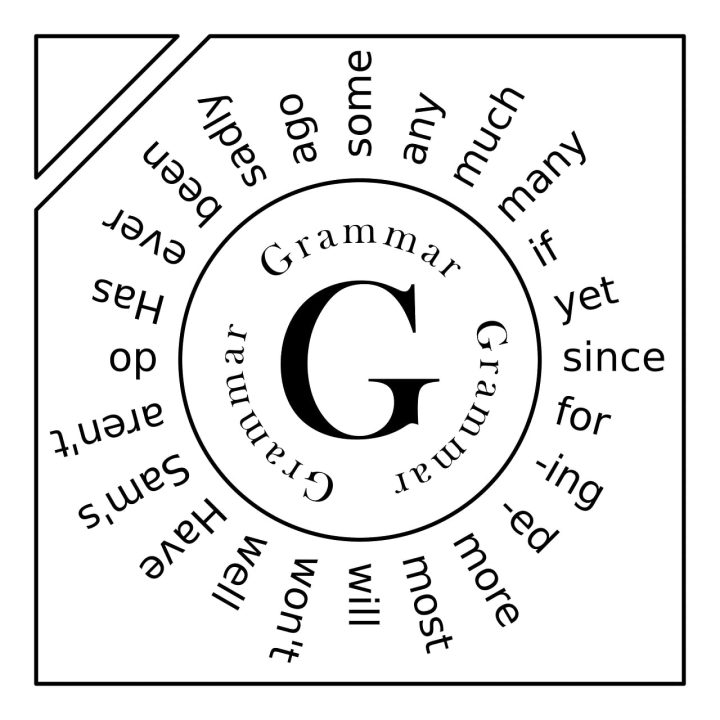By Hu Wo (Cuckoo’s Song)
In the language teaching-learning world, there is always a challenging question between linguistic teachers and learners. Is grammar needed in the teaching-learning process of a language? This question is quite easy to ask but will be totally difficult to answer, I should believe. Of course, whether a person uses the language in spoken or written forms, he will have used these language-related grammatical rules in his words or works of writing. To repeat, the spoken and written expressions of a language have both had traditionally systematic grammatical patterns. Any language user must not abstain from those patterns on purpose. On condition that they follow the common patterns of a language to the letter, anybody else will certainly understand them to the full extent that they want to mean. The grammar of a language may be changeable, to a greater or lesser degree, from age to age. But without grammar, words cannot be spoken or written correctly and clearly in the standard order. More frankly, grammatical errors are by far worse than spelling mistakes in the case of interpreting a language right simply because the spelling mistakes could be corrected and read easily, even by a normal literate person. Hence, the role of grammar is immense in teaching and learning language.
There are often two kinds of grammar in languages, namely, spoken grammar and written grammar. These two kinds of grammar may be different, similar or the same in pattern. For instance, the English language has many similarities in spoken and written grammar. The expression `I go to London tomorrow’ is the same in English grammar, whether it is spoken or written. Though the question `Do you understand?’ is right in the written or spoken form, the dialogue `Understand? ‘, `You got it?’ and `Got it?’ are commonly used in classroom language speaking, which are not suitable for writing.
Not-the-same spoken grammar is made possible in word usages and styles from language to language, from person to person, from region to region, from nation to nation, and even from time to time. For instance, `Hi! ‘, `Hello!’ and `How are you?’ are all friendly greetings, but the first one is deemed to be informal, while the second two are considered formal talks. In a Straightforward Series by Macmillan, the greeting hi is said between unfriendly people, whereas it would be better to say hello only between friendly ones. The answer to the question `Have you eaten?’ will be `I ate already’ in American English but `Yes, I have’ in British English respectively. This is because the past simple tense is used in AmE (American English), and the past participle tense in BrE is used for a completed action. And again, all people will have to answer `Yes, I will’ instead of `Yes, I’m’ or `Yes, I am’ if the question `Are you going home?’ is shot. That is why the modal verb `will’ is usually used when a person makes a spontaneous decision while speaking. There is no common use for words like `Yes, I’m’ except `Yes, I am’ in English.
Usually, spoken grammar is independent, short, and to the point, and it has common usage. Even if a person makes a mistake in vocabulary and grammatical usage whilst speaking, he or she will be able to say it right again. However, written grammar is often seen in black and white. Thus, it will not be as easy as expected to recorrect an error in written grammar with our eyes closed. Written grammar is extensive and complex as long as a sentence goes in meaning. It does not seem to matter to a person not having a good command of grammar when speaking, but grammar is a sort of writer’s life. Let us suppose, for example, that every boy likes football. This sentence is so simple. If written in flowery language, the sentence will become `There is no boy who does not like football’ or `There is no boy who does not like football’. If so, the meanings of these two sentences should be more beautiful than average. That sentence can still be written as follows: `It is every boy who likes football’ or `It is every boy that likes football’ or `It is football that every boy likes’. In the sentence patterns, the first two emphasize the subject `every boy’, though the third is the object `football’. Although not common, the passive voice `Every boy likes football’ looks possible to write yet.
Speakers, readers, writers, translators, and even students must not keep their distance from grammar. Nonetheless, any speaking or writing does not involve the essential rules of grammar only; these also contain subject matter as well as how to speak or write it by fitting a description. In spite of the fact that anything or anyone cannot be described solely by grammar, grammar may be a great barrier for language users. For example, the essential sentence structure of the English language is termed `Subject + Verb + Object + Manner + Place + Time + Reason/Purpose’ or `Subject + Verb + Place + Manner + Time + Reason/Purpose’ in general. This sentence is like `He is driving his own car slowly to the bank by noon so as to be free and easy’ or `He is driving to the bank slowly by noon so as to be free and easy’. Despite this, a phrase that wants to be emphasized in the English language is mostly put at the beginning of a sentence, such as the sentence, `By noon, he is driving his own car slowly to the bank so as to be free and easy’. In English, the phrase of place is expressed from narrow to wide and that of time from little to much, like the sentence `I was born in Thebwet village, the Ayeyawady delta on 23 March 1998’.
Nothing is permanent. Similarly, the grammar of a language is constantly changing from period to period. The sentence `To Greenwich Village, which is a section of New York City, many people came who were interested in art’ from The Last Leaf by O Henry is an old-fashioned English writing. At present, that sentence will be written as ` Many people who were interested in art came to Greenwich Village, which is a section of New York City’. In spite of this, the latter was not as attractive or interesting as the former in the author’s age, except that old-fashioned English is not accepted by most people now. Strangely, many changes have arisen in modern English. The modal verbs `shall’ and `will’ make a difference between their usages. We could only use `I/we shall’, where `shall’ meant showing just the future without any wish of the two subjects before, whilst the usage `I/we/others will’ represented the subjects doing something to their heart’s content. But now, only the modal verb `will’ is used just for the future simple excepting that `shall’ is found in the use of laws, rules and regulations. Also, it is apparent that the determiner `much’ should not be used in the positive sentence at present; instead, the determiner ‘a lot of’ should be used. The sentence `I have a lot of money’ is correct in current English, not `I have much money’, which we were otherwise able to use in the past.
Some say that grammar is not a must-study in the language. I would not like to deny their claim for the simple reason that they will have language acquisition or enough extensive reading. On the other hand, no need to study grammar at all will be wrong. Books on grammar from every corner of the globe are not for nothing. Whatever is said, the people who think that grammar is not important for language learning had better speak or write the language correctly by grammar. Readers with rich grammar knowledge can taste more of the aesthetic beauty of literature than those without it. Such authors must also be able to create more distinctive works of writing than regular writers. Hence, grammar teaching in the curriculum will lead to effective and efficient practice in writing with accuracy and fluency. If a person starts to take up English, they have to study articles and tenses in the language first. Their study ought to rely on mother tongue contact or second language skills. Second language learners need to read the daily news, at least written merely in that language; otherwise, it would be best if they stay in a language-speaking country for a few years, as Saya Zaw Gyi suggested. Finally, what language learners shall always remember is that the long journey to linguistic study will never end.












